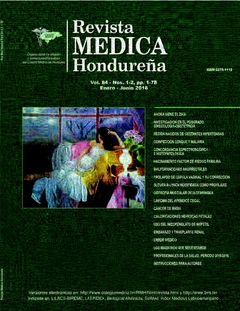Description of cases of dengue and malaria coinfection, Hospital Escuela Universitario, Tegucigalpa, Honduras, 2010 – 2014
Keywords:
Coinfection, Dengue, Dengue virus, Malaria, PlasmodiumAbstract
Background: Honduras is an endemic country of dengue and malaria. Coinfection is informed less frequently, possibly due to under-registration. It has been described a more severe clinical presentation than single infections. Objective: To identify frequency and characteristics of malaria and dengue coinfection cases, Hospital Escuela Universitario (HEU), 2010-2014. Methods: Cross-sectional descriptive study. Cases were identified by comparison of malaria registers, Parasitology Service, HEU, with dengue data base, Surveillance Department HEU and National Virology Laboratory, Ministry of Health. Clinical Charts were reviewed. Case: individual with dengue and malaria confirmed by laboratory tests; suspected case: individual with malaria confirmed by laboratory and certified as dengue case by the Certification Commission, without laboratory confirmation. Results: 6,164 dengue cases, 216 malaria cases and 27 suspected cases of coinfection were reported during the study period. Three cases were confirmed (7.5% of malaria and 2.5% of dengue cases): women, 21 years average age (range 14-34), coming from Francisco Morazán, Olancho and Comayagua; all Plasmodium vivax cases, one complicated malaria case; none severe dengue case and all managed as dengue group B. Twentyfour suspected cases were not confirmed, 47.8% (11/27) were not in Virology Laboratory´s database, 17.3% (4/23) without laboratory results, 21.7% (5/27) with negative IgM result (4 with inadequate sample). Discussion: three cases of dengue and malaria coinfection were confirmed in 2012. We documented failure in the information registration procedures hampering an adequate analysis. The surveillance of the coinfection could be more effective through confirmed malaria cases.
Downloads
285




